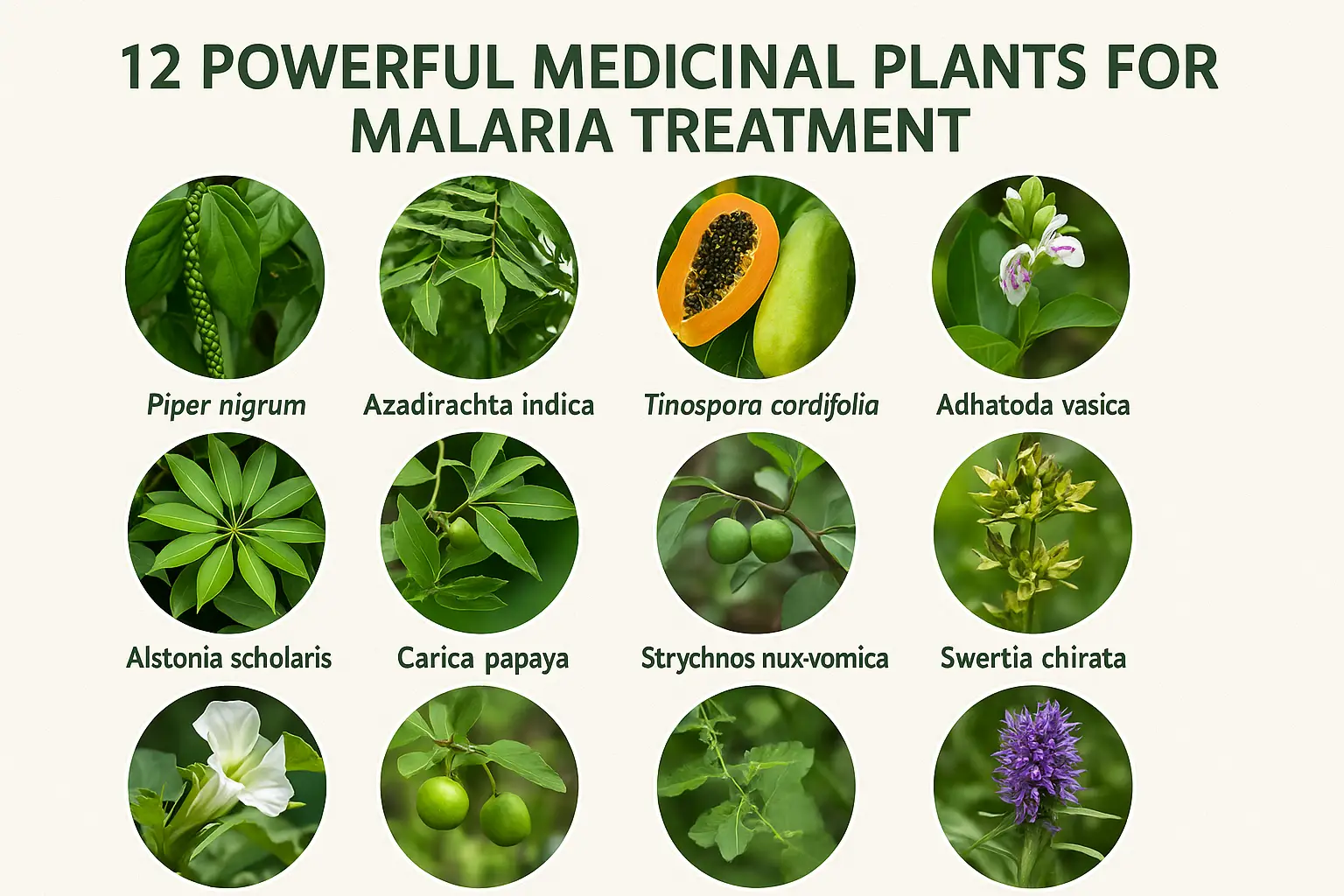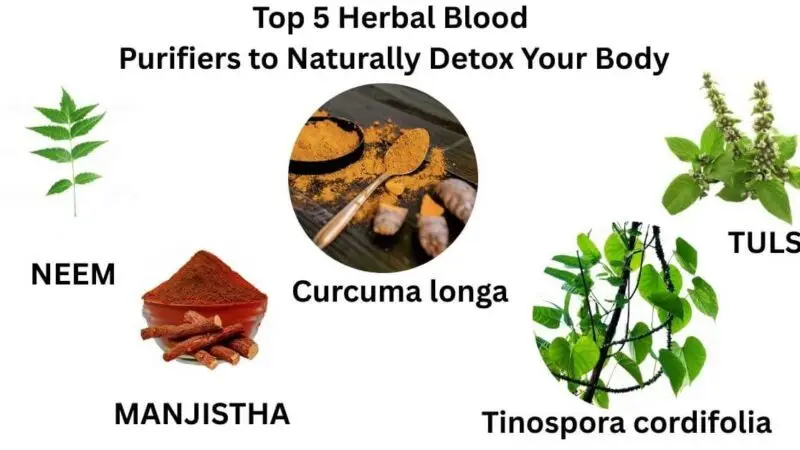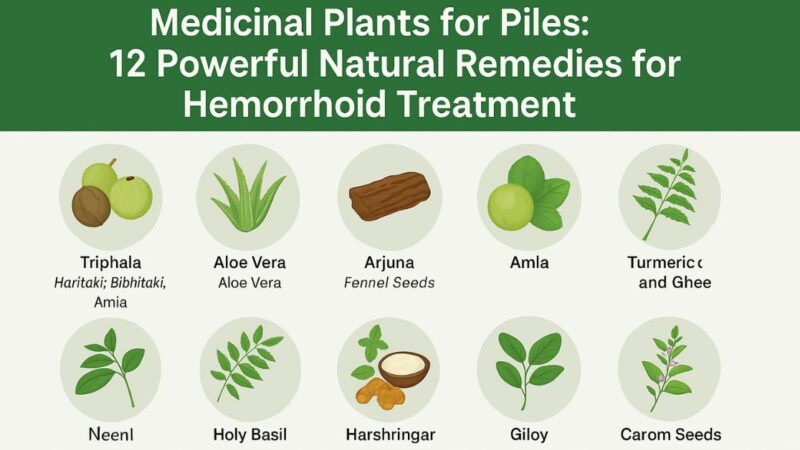Heart Diseases – Treat and Prevent with These 12 Ayurvedic Herbs
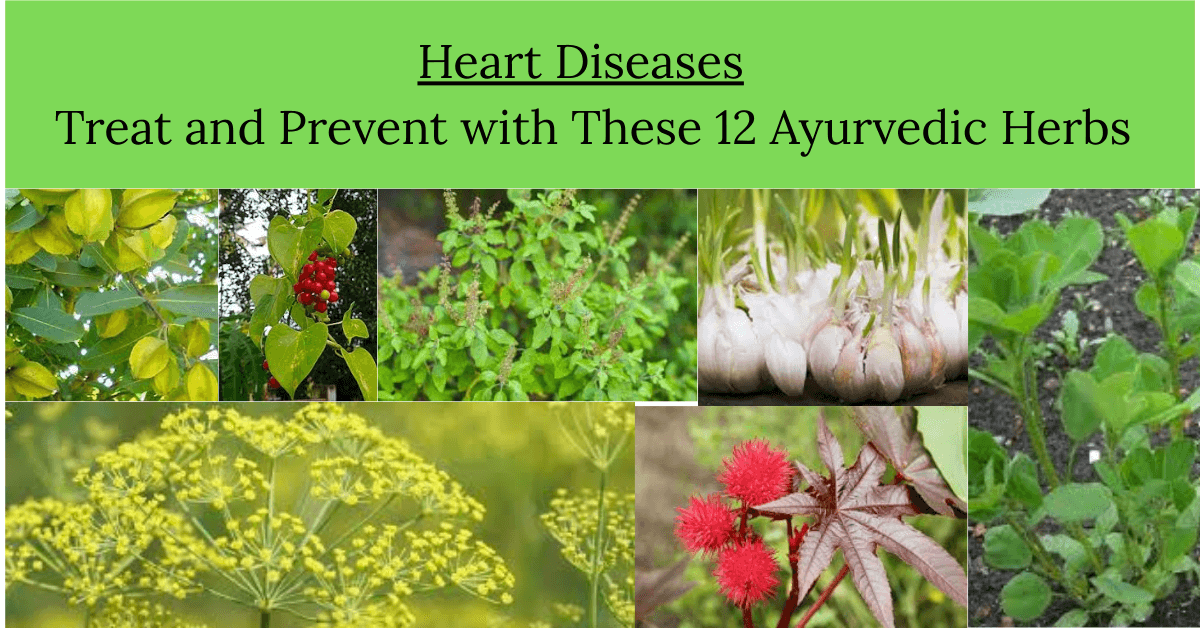
🌿 Medicinal Plants Useful in the Treatment of Heart Diseases
Introduction
Heart disease remains one of the leading causes of death globally, affecting millions every year. With a rise in sedentary lifestyles, poor dietary habits, and increasing stress, heart conditions like coronary artery disease, hypertension, and heart failure are becoming alarmingly common. While modern medicine offers surgical and pharmacological solutions, these treatments often come with side effects and long-term dependencies. This is where traditional remedies and ethnobotanical approaches step in. Using medicinal plants for cardiovascular wellness isn’t just a cultural relic—it’s a scientifically backed alternative or complement to conventional care.
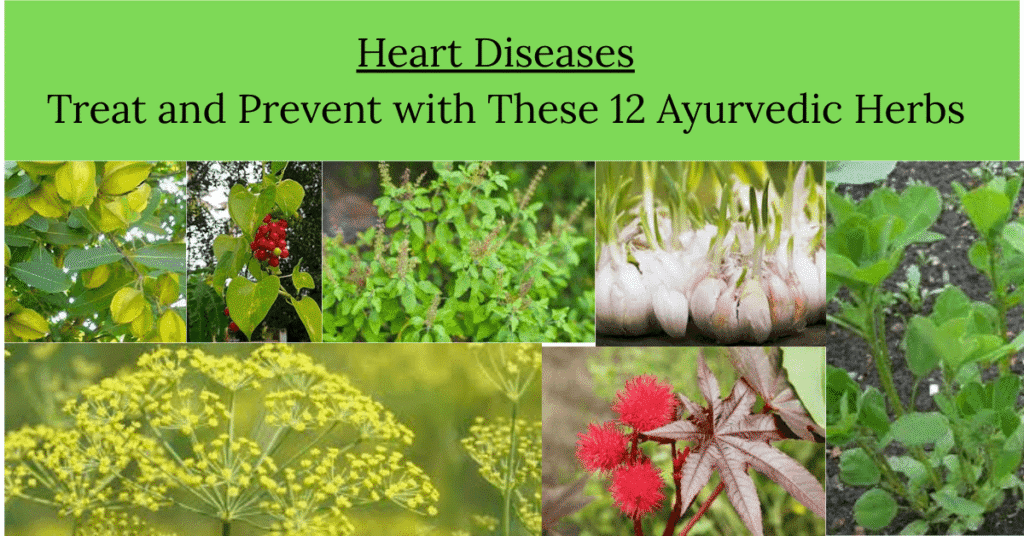
Many herbs have stood the test of time and continue to be used in various cultures, especially in Ayurveda and traditional medicine, to improve heart function, regulate blood pressure, enhance circulation, and reduce cholesterol levels. These plants are not only affordable and accessible but also generally safe when used properly. In this article, we’ll take a deep dive into twelve potent medicinal plants that have been traditionally used to prevent and treat heart diseases—starting with the legendary Arjuna tree.
Ethnobotanical Importance in Heart Disease Treatment
Ethnobotany refers to the study of how people from specific cultures and regions use indigenous plants for medicinal purposes. In the context of heart disease, ethnobotanical knowledge has unlocked a variety of therapeutic plants known for their cardioprotective effects. These aren’t just folk tales; many of these remedies have been validated by modern science for their pharmacological properties.
What makes ethnobotanical approaches so powerful is the focus on holistic healing. These plants work not just on the heart but on interconnected systems—like the nervous system, circulatory system, and digestive system—that influence cardiovascular health. Traditional healers have passed down generations of knowledge, identifying which plants to use, how to prepare them, and how frequently they should be consumed. From decoctions and tinctures to powders and fresh juices, these natural formulations offer a multifaceted defense against heart ailments.
Let’s now look at some of the most potent plant-based solutions that have been revered in ethnomedicine for centuries.
Terminalia Arjuna (Arjuna)
Strengthens Heart Muscles
Terminalia Arjuna, commonly known as Arjuna, is a cornerstone of Ayurvedic cardiology. Found predominantly in the Indian subcontinent, the bark of the Arjuna tree is packed with bioactive compounds such as flavonoids, tannins, glycosides, and saponins—all known to support heart function. Arjuna is particularly effective in strengthening the cardiac muscles and improving the ejection fraction of the heart, which is vital for individuals suffering from heart failure or other myocardial diseases.

This herbal remedy is widely appreciated for its ability to reduce anginal pain (chest pain due to reduced blood flow to the heart), manage blood pressure, and prevent the hardening of arteries. Research also supports its role in reducing total cholesterol and LDL (bad cholesterol) while increasing HDL (good cholesterol), making it an excellent preventive measure for atherosclerosis.
Preparation and Dosage
The most common form of Arjuna consumption is a decoction made from its bark. The bark is dried, powdered, and then boiled in water until it reduces by half. Drinking this warm decoction once or twice daily can yield remarkable benefits over time. Some people prefer capsules or tablets that contain standardized extracts of Arjuna for convenience, but traditionalists often stick to the pure bark form for maximum potency.
It’s important to consult with a healthcare provider before starting, especially if you’re already on blood pressure or cholesterol-lowering medication. The synergy of modern and traditional approaches, when done responsibly, can significantly enhance cardiovascular health.
Tinospora Cordifolia (Giloy)
Controls Blood Pressure
Giloy, also known as Tinospora Cordifolia, is a climbing shrub celebrated in Ayurvedic medicine for its immunomodulatory and anti-inflammatory properties. But beyond its role in boosting the immune system, Giloy has profound benefits for heart health—especially in regulating blood pressure.
High blood pressure is a silent killer that significantly increases the risk of heart attack, stroke, and kidney failure. Giloy helps to maintain the elasticity of blood vessels and supports the kidneys in eliminating excess sodium from the body. This results in better vascular health and more stable blood pressure levels, which are crucial for preventing cardiac overload and subsequent failure.
Daily Intake and Benefits
Giloy can be consumed in several forms, including fresh stem juice, capsules, and decoctions. For heart health, the fresh juice of Giloy stem is recommended—about 10 to 15 ml on an empty stomach in the morning. You can mix it with a little water or combine it with Amla juice for a double punch of antioxidants.
Regular intake not only helps in blood pressure management but also reduces oxidative stress, thereby lowering the risk of cardiovascular damage. If you’re dealing with chronic hypertension, Giloy could be a valuable natural adjunct to your treatment plan, under professional supervision.
Ocimum Sanctum (Tulsi)
Fights Heart Infections
Holy Basil, or Tulsi, is another powerful adaptogenic herb with a wide range of therapeutic effects. In the context of heart health, Tulsi is particularly valuable for its antimicrobial and anti-inflammatory properties. It helps reduce infections that could potentially affect the endocardium (inner lining of the heart), especially in individuals with existing heart defects or valve issues.
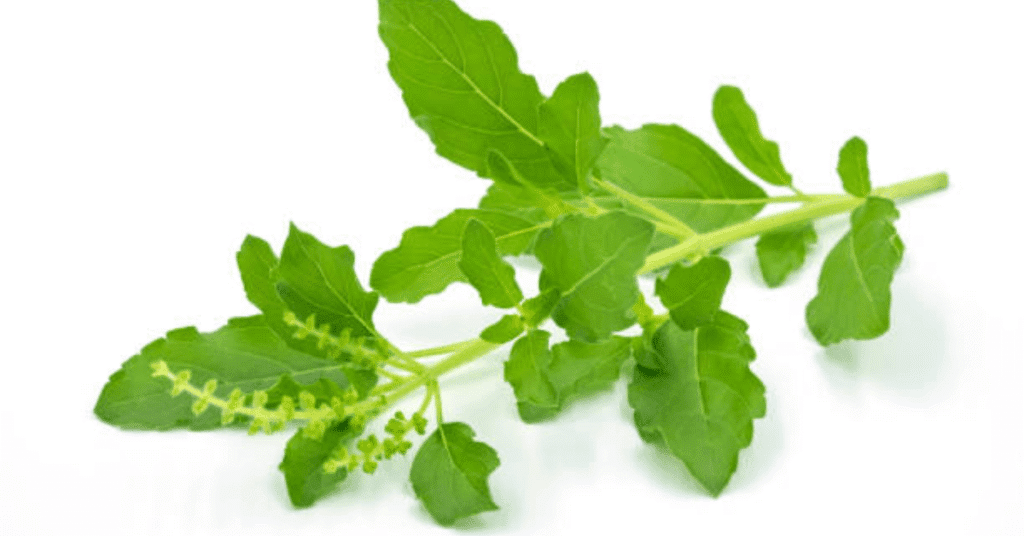
The essential oils present in Tulsi leaves—such as eugenol and ursolic acid—not only improve immunity but also promote optimal blood flow by reducing inflammation and dilating blood vessels. Additionally, Tulsi combats oxidative stress and protects the heart from free radical damage, which is a key contributor to plaque formation in arteries.
Role of Antioxidants
Antioxidants are crucial in the fight against heart disease, and Tulsi is loaded with them. Flavonoids and phenolic compounds in the plant reduce bad cholesterol and promote better lipid profiles. Regular consumption can also reduce cortisol (the stress hormone), which indirectly benefits heart rate and rhythm stability.
A simple way to include Tulsi in your routine is by drinking Tulsi tea or consuming its juice extract. It’s safe, effective, and highly versatile. Start with 5–10 fresh leaves in warm water every morning, or take 5 ml of juice mixed with honey for an energizing and heart-healthy tonic.
Allium Sativum (Garlic)
Lowers Cholesterol and Thins Blood
Garlic, or Allium sativum, is a kitchen staple with potent medicinal qualities—especially when it comes to heart health. This humble bulb is loaded with sulfur-containing compounds, most notably allicin, which provides its characteristic pungent smell and myriad health benefits. Garlic is a natural blood thinner and has a significant impact on lipid levels, making it an ideal herb for managing high cholesterol and preventing blood clots.
Numerous clinical studies have confirmed garlic’s ability to reduce total cholesterol, LDL (bad cholesterol), and triglycerides while slightly boosting HDL (good cholesterol). Furthermore, garlic reduces platelet aggregation, making it harder for clots to form, which is crucial in preventing heart attacks and strokes.
Cardioprotective Effects
The cardioprotective nature of garlic extends beyond cholesterol control. It also reduces arterial stiffness and improves endothelial function, which refers to the health of the lining inside your arteries. Healthy endothelium ensures smooth blood flow and proper dilation of blood vessels, thereby reducing the risk of hypertension and atherosclerosis.
For therapeutic use, one or two raw garlic cloves crushed and consumed on an empty stomach are often recommended. Garlic supplements are also available, but they should contain standardized allicin content for maximum effectiveness. Always consult a healthcare provider before combining garlic with blood-thinning medications to avoid any adverse interactions.
Foeniculum Vulgare (Fennel)
Regulates Heartbeat
Fennel seeds, or Foeniculum vulgare, may be best known for their digestive benefits, but they also play an impressive role in heart health. Rich in fiber, potassium, magnesium, and phytonutrients, fennel helps regulate heart rhythms and maintain optimal blood pressure. The potassium content is especially important because it balances out the harmful effects of sodium, thereby protecting against hypertension.
Arrhythmia, or irregular heartbeat, is a common symptom of cardiovascular distress. Fennel’s volatile oils, such as anethole and fenchone, have mild sedative properties that can calm nerve impulses and promote a steady heartbeat. This makes fennel particularly valuable for those who suffer from stress-induced palpitations or anxiety-related heart rhythm issues.
How to Use Fennel Effectively
You can incorporate fennel into your daily diet in various ways. One effective method is to drink fennel seed tea—simply steep one teaspoon of crushed seeds in hot water for 10 minutes and drink it twice a day. Alternatively, chew a small amount of raw seeds after meals to not only aid digestion but also support cardiovascular health.
Fennel is also a good source of dietary fiber, which helps in reducing blood cholesterol levels by binding with bile salts and removing them from the body. Over time, this can reduce the overall burden on the heart and arteries.
Ricinus Communis (Castor)
External Application for Circulation
Castor oil, derived from the seeds of Ricinus communis, is traditionally used for many purposes—detoxification, joint pain relief, and more. But one lesser-known application is its use in promoting blood circulation when applied externally. Poor circulation is a contributing factor in many cardiovascular issues, including varicose veins, high blood pressure, and peripheral artery disease.
When massaged onto the skin, especially over the chest and limbs, castor oil penetrates deep into tissues and promotes lymphatic drainage and blood flow. The ricinoleic acid in castor oil acts as an anti-inflammatory agent, helping to reduce stiffness and improve oxygen delivery throughout the body.
Oil Massage Benefits
To use castor oil for heart support, warm a small quantity and massage it gently over the chest area or limbs for about 10–15 minutes. You can also apply a castor oil pack—a cloth soaked in warm oil and placed on the chest with a hot water bottle—for deeper penetration. Doing this regularly can help reduce fluid retention, improve vascular tone, and ease symptoms like cold extremities and fatigue.
While it doesn’t replace internal treatments, external castor oil use can be a wonderful complementary therapy for improving circulation and overall cardiovascular wellness.
Trigonella Foenum-Graecum (Fenugreek)
Controls Blood Sugar
Fenugreek, or Trigonella foenum-graecum, is not only popular in culinary traditions but is also a powerhouse herb for metabolic and cardiovascular health. One of the major risk factors for heart disease is uncontrolled blood sugar, especially in diabetic patients. Fenugreek helps in regulating glucose levels by improving insulin sensitivity and slowing down carbohydrate absorption.
The seeds are rich in soluble fiber, which not only helps in stabilizing blood sugar but also reduces cholesterol levels. Fenugreek contains compounds like saponins and galactomannan that lower LDL cholesterol and triglycerides without affecting HDL cholesterol levels, making it a dual-action herb against diabetes and heart disease.
Importance in Heart Disease Prevention
Including fenugreek in your daily routine can significantly reduce the chances of developing metabolic syndrome—a cluster of conditions including high blood pressure, high blood sugar, excess body fat, and abnormal cholesterol levels. Soaking fenugreek seeds overnight and consuming them on an empty stomach is one of the simplest and most effective methods.
You can also add powdered fenugreek seeds to smoothies, yogurt, or baked goods to increase their nutritional profile. However, be cautious if you’re already on diabetes medication, as fenugreek may enhance their effects and require dosage adjustments.
Withania Somnifera (Ashwagandha)
Reduces Stress, Boosts Heart Health
Ashwagandha, or Withania somnifera, is a revered adaptogen in Ayurvedic medicine. Chronic stress is a major contributor to heart disease, affecting blood pressure, heart rate, and arterial function. Ashwagandha helps the body adapt to stress by regulating cortisol levels and reducing systemic inflammation, making it a fantastic tonic for cardiovascular health.
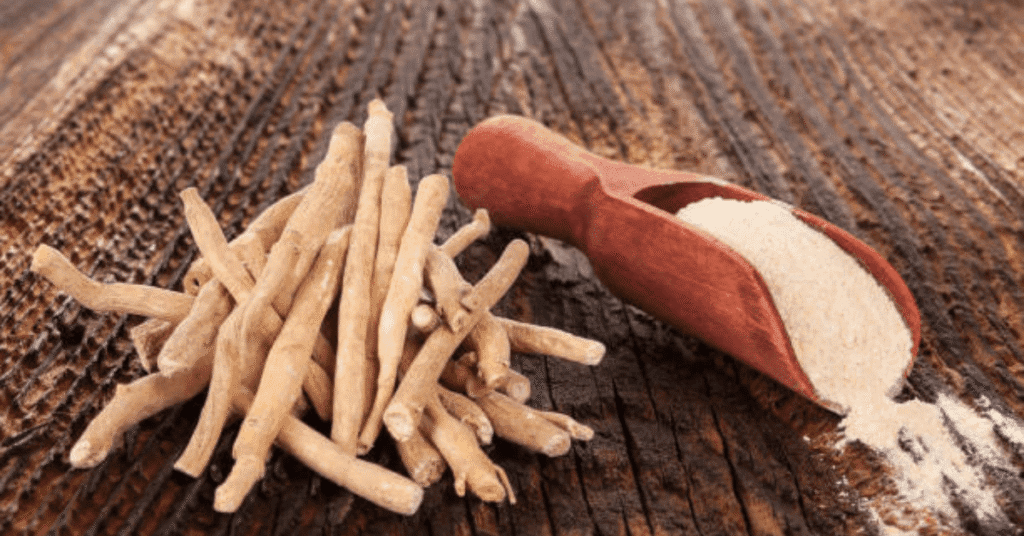
This herb also enhances cardiorespiratory endurance, improves VO2 max (the amount of oxygen your body can utilize), and helps in reducing anxiety—all of which are beneficial for people with heart conditions. By calming the nervous system, Ashwagandha indirectly supports stable heart rhythms and better blood pressure control.
Daily Regimen for Best Results
Ashwagandha can be consumed in powder, capsule, or tincture form. A typical dosage ranges from 300 mg to 600 mg of standardized extract per day. When using the powdered root, mix one teaspoon in warm milk or water, preferably before bedtime to enhance sleep quality and reduce nighttime stress.
Over time, incorporating Ashwagandha into your daily routine can lead to improved energy, better mood, and enhanced heart function—especially when combined with other lifestyle interventions like regular exercise and a balanced diet.
Citrus Limon (Lemon)
Enhances Blood Flow
Lemon, or Citrus limon, is more than just a refreshing addition to drinks—it’s a heart-healthy powerhouse. Rich in vitamin C, antioxidants, and essential oils, lemon is particularly effective in enhancing blood flow and supporting vascular health. Vitamin C, in particular, strengthens the walls of arteries and helps prevent the buildup of plaque, which is a key factor in atherosclerosis.
One of the greatest benefits of lemon is its alkalizing effect on the body. Despite being acidic in nature, lemon helps balance pH levels internally, reducing inflammation and supporting metabolic processes. This indirectly contributes to improved heart health by minimizing the oxidative stress that contributes to cardiovascular damage.
Natural Detox for Arteries
Lemon also acts as a natural detoxifier. Drinking warm lemon water daily helps flush out toxins, purify the blood, and reduce the load on the liver. This, in turn, benefits the cardiovascular system by keeping the arteries clean and the blood free of harmful waste.
To make a heart-friendly detox drink, squeeze the juice of half a lemon into a glass of lukewarm water and drink it first thing in the morning. For added benefits, you can mix in a teaspoon of honey or a pinch of turmeric. Over time, this simple habit can improve circulation, prevent clot formation, and keep your heart functioning at its best.
Zingiber Officinale (Ginger)
Improves Blood Circulation
Ginger, or Zingiber officinale, is a widely used root that offers incredible benefits for the cardiovascular system. Thanks to compounds like gingerol and shogaol, ginger helps in relaxing blood vessels, improving blood flow, and reducing blood pressure. It also thins the blood slightly, which helps in preventing clots that could lead to heart attacks or strokes.
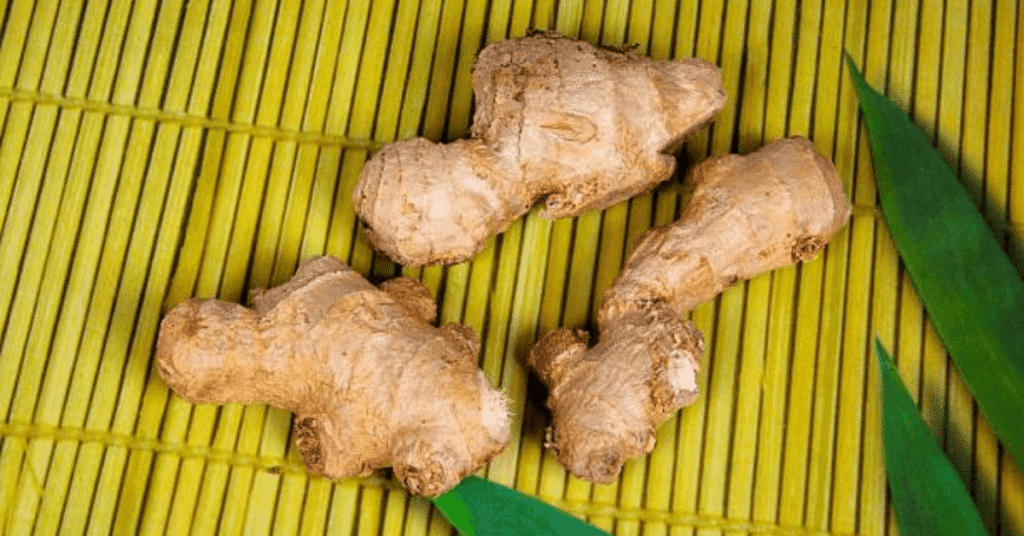
In traditional medicine, ginger is often used to treat cold extremities, sluggish blood flow, and poor digestion—all of which are indirectly linked to poor heart function. Ginger improves vasodilation, allowing the blood vessels to widen and carry more oxygen and nutrients to the tissues.
Anti-Inflammatory Properties
Inflammation is a hidden culprit behind many chronic diseases, including heart disease. Ginger’s anti-inflammatory effects reduce the strain on the arteries and lower systemic inflammation, thus protecting the endothelium (inner lining of blood vessels) from damage.
To incorporate ginger into your routine, you can use it fresh, dried, or in powdered form. Try adding grated ginger to hot water with lemon for a daily circulation-boosting tea, or use it in cooking to enhance flavor and health benefits. Ginger supplements are also available but should be used with caution if you’re on blood-thinning medication.
Carica Papaya (Papaya)
Reduces Blood Clotting
Papaya, specifically the juice extracted from its leaves, has been traditionally used in various cultures for its remarkable health benefits. While it’s commonly known for improving platelet counts, especially in viral infections like dengue, papaya leaf juice also plays a role in heart health by reducing excessive clotting tendencies.
Blood clotting is a natural defense mechanism, but when it occurs inappropriately within the blood vessels, it can lead to life-threatening conditions like stroke or heart attack. The bioactive compounds in papaya leaves—such as papain and flavonoids—help in maintaining the right balance in the coagulation system.
Papaya Leaf Juice Benefits
Drinking papaya leaf juice daily can help in thinning the blood naturally and maintaining smoother circulation. It also boosts the immune system and reduces inflammation, both of which contribute positively to cardiovascular health.
To make the juice, crush fresh papaya leaves and strain the liquid. Drink 5–10 ml daily, ideally on an empty stomach. While it may taste bitter, its long-term benefits are significant. Always ensure the leaves are clean and pesticide-free before use. Also, consult your healthcare provider if you are on anticoagulant therapy to avoid potential interactions.
Syzygium Cumini (Jamun)
Supports Cardiovascular Health
Jamun, also known as Syzygium cumini or black plum, is an underrated fruit when it comes to heart health. Its seeds, in particular, are rich in antioxidants, alkaloids, and flavonoids that support cardiovascular well-being. Jamun seed powder helps manage blood sugar levels, reduce oxidative stress, and improve lipid profiles—all of which are critical factors in heart disease prevention.
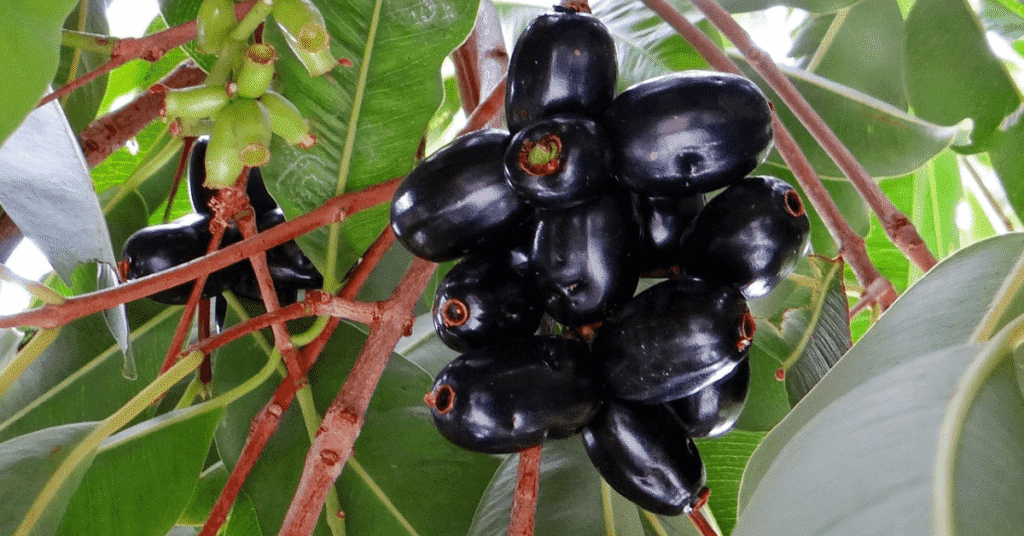
Jamun is also effective in reducing high blood pressure. It contains potassium and magnesium, which relax the blood vessels and help in maintaining a stable heartbeat. Additionally, the anti-inflammatory properties of Jamun support the health of blood vessels and prevent them from becoming stiff or clogged.
Jamun Seed Powder Usage
To harness the heart-friendly benefits of Jamun, the seeds are dried and ground into a fine powder. Take 1–2 grams of this powder daily, preferably mixed with warm water or honey. This simple herbal remedy can regulate cholesterol, blood sugar, and blood pressure over time.
For added benefits, combine Jamun seed powder with other supportive herbs like fenugreek or Arjuna. Always use fresh, organic seeds for the best results. With regular use, Jamun helps create a healthier internal environment that protects the heart and promotes longevity.
Conclusion
Nature has always had its own pharmacy, offering us time-tested remedies for modern ailments. When it comes to heart disease—a condition influenced by lifestyle, genetics, and stress—turning to natural solutions like medicinal plants can be both preventive and therapeutic. From Arjuna that strengthens cardiac muscles to garlic that purifies your blood, and from fenugreek’s sugar-regulating abilities to the circulatory benefits of ginger, each plant mentioned here contributes uniquely to your cardiovascular wellness.
These plants not only address the symptoms but often work at the root level—balancing hormones, reducing inflammation, detoxifying the body, and improving circulation. However, it’s crucial to remember that while these herbs can support heart health, they should be used responsibly and, ideally, under the guidance of a healthcare professional, especially if you’re already on medication.
The fusion of traditional wisdom and modern science offers a powerful approach to heart care. So why not take a leaf out of nature’s book—literally—and give your heart the holistic care it deserves?
FAQs
1. Can I use multiple herbs together for better heart health?
Yes, many of these herbs can be combined for synergistic effects. For instance, Arjuna and Ashwagandha can support both heart strength and stress reduction. However, always consult a professional before mixing herbs, especially if you’re on medication.
2. Are there any side effects of using herbal remedies for heart disease?
Most herbs are safe when used in appropriate doses, but excessive use can lead to side effects. For example, too much garlic can thin the blood excessively. Always start with small doses and consult a healthcare provider.
3. How long does it take to see results from herbal remedies?
Natural remedies work gradually. You may start noticing benefits in 2–4 weeks, but consistent use over several months is often necessary for lasting results.
4. Can these herbs replace my heart medication?
No, herbal remedies should complement—not replace—prescribed medication unless advised by a medical professional. They are best used as part of a holistic lifestyle plan.
5. Is it safe for heart patients to use lemon daily?
Yes, lemon is generally safe and beneficial for heart patients. However, those with citrus allergies or acid reflux issues should use it with caution.

